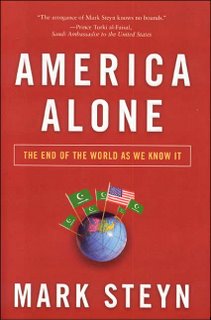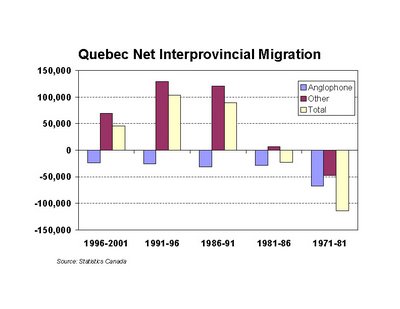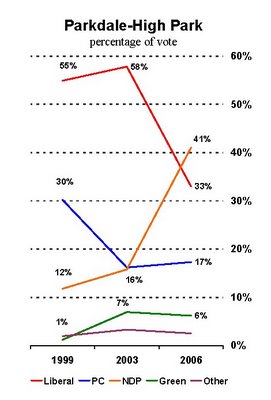Sunday, November 05, 2006
Should Garth be asked to leave the Blogging Tories?
Garth is a publicity hound. If he doesn't make it in politics, he will seek some other venue to stroke his enormous ego. Kicking him out of the Blogging Tories would only give him more attention.
Turner's tactics are questionable at best, and given time will likely backfire. His actions suggest that he is plotting a media career after he fails in politics. We all have our reasons for blogging, but if Garth self identifies as a Blogging Tory, so be it. The Blogging Tories serves as a blog aggregator, not an arbiter of opinion. I actually agree with him on some things. It his just his tactics I abhor.
However, if Turner is so concerned about all those Canadians who seem to have lost their life savings because of a decision to tax non-taxable investors, then his attention would best be directed at the financial advisors and DIY investors who put all their money into income trusts.
If you can't stand the heat of the stock market, then invest in GICs. Stock markets are inherently risky and that is why it is best to diversify your investments across asset classes. If Canadians ignore this fundamental tenet of portfolio management, they have no one to blame but themselves. Sure, Flaherty's decision hurt, but a diversified portfolio would have largely protected you.
Fundamentally, Garth is arguing against individual responsibility. He seems to want the government to guarantee people's investments. That would be an absolute disaster for the Canadian economy as capital would be allocated without any consideration of risk. Ultimately, the decision to tax income trusts has provided a warning to all investors that there is no sure thing. If you haven't heard it before, the best advice is don't put all your eggs in one basket.
Saturday, November 04, 2006
Thanks Amazon.ca
 I got my copy of Mark Steyn's new book America Alone
I got my copy of Mark Steyn's new book America AloneApparently, Paul Well's book Right Side Up
Thanks Amazon.ca.
Saved by technology?
For example, LEDs hold considerable promise in reducing future energy consumption:
Light-emitting diodes will become economically attractive as replacements for conventional lightbulbs in about two years, a shift that could pave the way for massive electricity conservation, according to a researcher.
Right now, consumers and businesses can buy a light-emitting diode, or LED, that provides about the same level of illumination as an energy-hogging conventional 60-watt lightbulb, Steven DenBaars, a professor of material science at the University of California Santa Barbara, said at the SEMI NanoForum, taking place here this week. A principal advantage of the LED: It lasts about 100,000 hours, far longer than the conventional filament bulb.
Unfortunately, the LEDs that can perform this task cost about $60, he said. (Prices vary on the Internet.) But prices have been declining by 50 percent a year, so two years from now the same LED should cost around $20.
"At $20 the payback in energy occurs in about a year," DenBaars said. The rapid return on investment will occur in places such as stores and warehouses, where the light is on through much of the day. A year after that, LEDs will be even more economical for more places as costs continue to decline.Approximately 22 percent of the electricity consumed in the United States goes toward lighting, according to the U.S. Department of Energy
To make matters worse, traditional lightbulbs are incredibly inefficient. Only about 5 percent of the energy that goes into them turns into light. The majority gets dissipated as heat.
If 25 percent of the lightbulbs in the U.S. were converted to LEDs putting out 150 lumens per watt (higher than the commercial standard now), the U.S. as a whole could save $115 billion in utility costs, cumulatively, by 2025, said DenBaars, and it would alleviate the need to build 133 new coal-burning power stations.
In a similar vein, Amory Lovins has argued that by lightweighting our automobiles and switching to biofuels to run them, we could cut our oil consumption for automobile transportation to zero by 2040.
Closer to home, residential and commercial developers are working with firms such as Clean Energy Developments to tap growing consumer demand for clean energy systems. Technologies such as geothermal exchange can reduce a property's heating and cooling costs to a small fraction of traditional methods.
Taken singly, the impact of any of these methods alone is minimal. But cumulatively, it adds up.
Many promising technologies such as carbon sequestration in oil and gas, afforestation, and biomass-based energy are also being pursued. Our cause is certainly not hopeless, whether it is to reduce carbon or to wean ourselves from Middle-East oil. Ten years from now, we may even consider Kyoto to have been excessively unambitious. It won't happen overnight, but given sufficient time, the problems are not insurmountable. Scepticism about human ingenuity is understandable, but we may yet be saved by technology.
Thursday, November 02, 2006
Too many eggs in the income trust basket
That is why financial advisers routinely recommend a well-diversified portfolio with holdings across asset classes. Holding all your eggs in the income-trust basket is simply asking for trouble. Consequently, it is hard to feel sorry for people like this guy:
Richard Milne, 74, who has invested most of his family’s savings in income trusts, estimated his losses following Tuesday’s tax decision at $50,000, although he says he hopes for some rebound. "They reneged on their promise," he said. "That really upsets me."
With any policy change, it is inevitable that some people will benefit and some people will get hurt. But this guy has clearly ignored the basic tenets of portfolio diversification: don’t put all your eggs in one basket. Rather than blaming the government, people should be taking it up with their financial advisor since it was common knowledge that something would have to give, particularly once BCE announced its intention to convert to the income trust structure.
In my view, Flaherty's decision on income trusts was a bold and brilliant move. Basically, it levels the playing field between corporations and income trusts, without raising the overall tax burden. At the same time, Canadian taxpayers will no longer be subsidizing foreign investors in Canadian income trusts.
Unlike Ralph Goodale, the previous Liberal Finance Minister, Flaherty acted quickly and decisively on this issue. Canada now has a tax policy that will require CEOs to focus on creating shareholder value the traditional way—by succeeding in the marketplace—rather than through financial and tax legerdemain. For seniors and other income trust investors, the damage is smartly mitigated by a phase-in period for existing trusts and income-splitting measures for pensioners.
Still, those investors affected by the change need to realize that their cash flows from income trust investments will not change very much if they were already being taxed at the personal level. While the decline in income trust share prices will hurt when it comes time to draw upon one's capital in late-retirement years, effective yields have now gone up (since the shares are less attractive to non-taxable and foreign investors and prices have gone down), which is good for those making new investments in existing income trusts.
The fallout from this decision illustrates one of the pitfalls of DIY investing. Too many investors, regrettably many of them seniors, do not seem to be cognisant of the investment risks of their portfolios. Yet they manage portfolios worth hundreds of thousands of dollars or more by themselves. While the yields on income trusts may seem attractive, there is a reason for it – they are risky investments, not GICs. Putting all your money in the income trust basket is not a very prudent approach to take in managing one's retirement savings. Any responsible financial advisor will tell you that. The government may make a convenient scapegoat for your incompetence, but ultimately, if you got hurt, you have only yourself to blame.
Friday, October 27, 2006
Eight years of the National Post
Congratulations to the editors and writers of the Post for providing the most interesting daily read in Canada. Without doubt, it is the best newspaper in Canada. The wide range of commentary and its balanced coverage, combined with its centre-right editorial perspective, make it unique in Canada -- it is a paper you can trust.
I've been a National Post subscriber since the beginning and keep the little acrylic tombstone with an encased replica of the front page of the inaugural edition I received on its launch on my bookcase. Fortunately, the paper is getting even better. They have been bulking up on their coverage of local Toronto issues, as well as sports, in a bid to become the only paper Torontonians need to read. If you are not reading it, try it out with a free 90-day trial subscription here.
Thursday, October 26, 2006
Not so scary
 After all the talk about how scary Stephen Harper was in the last election, I figured we would be seeing lots of Stephen Harper costumes this Halloween. Somehow, I don't think this will be the case. Canadians don't find him all that scary.
After all the talk about how scary Stephen Harper was in the last election, I figured we would be seeing lots of Stephen Harper costumes this Halloween. Somehow, I don't think this will be the case. Canadians don't find him all that scary.Still, that hasn't stopped some from searching for a Stephen Harper mask. Too bad for her, I don't think she will find one. I was out shopping with my daughter for Halloween costumes yesterday at Malabar and while they had plenty of Frankenstein and George Bush masks, Stephen Harper didn't make the cut.
For those of you looking for other celebrity mask ideas for Halloween, check out Forbes. They've got masks for Kim Jong II, Stephen Colbert, Hugo Chavez and Katie Couric, among others, that you can print out and wear on Halloween. Now some of these guys are really scary.
Monday, October 16, 2006
Making a committment to the Toronto newspaper market
 For the second time in a week, the National Post was not on my doorstep when I left for work this morning. Apparently, there was a "delay in production." This happens every couple of weeks and every time it happens, I buy a copy of the Globe and Mail to read on the subway to work since I can usually snag a copy of the Post at the office. This is not the way to run a newspaper.
For the second time in a week, the National Post was not on my doorstep when I left for work this morning. Apparently, there was a "delay in production." This happens every couple of weeks and every time it happens, I buy a copy of the Globe and Mail to read on the subway to work since I can usually snag a copy of the Post at the office. This is not the way to run a newspaper.The source of the problem seems to be that the National Post does not even have its own printing plant in its most important market. In an age of contracting out, that in itself, is not a problem. Many publications can be produced more efficiently at the specialized facilities of commercial printers. The issue for the National Post is that the newspaper is actually printed at the Toronto Star's production facilities. So when there are production difficulties with the Toronto Star, the National Post gets bumped.
If the National Post is to make a credible committment to the Toronto market, it must have first claim on a printing press. It cannot play second fiddle to a competitor publication to the detriment of its subscribers. In the process, it would quickly lay to rest recurring rumours of its impending demise.
Saturday, October 14, 2006
Beryl Wajsman's Civil Conservatism
Since that time, Wajsman has not faded into the woodwork. He keeps up a whirlwind pace writing commentary for the Institute for Public Affairs of Montreal of which he is president, started Barricades Magazine of which he is the publisher and hosts The Last Angry Man on Montreal’s 940 AM.
Wajsman's latest essay On Civil Conservatism is reprinted on The Conservative Voice. It is well worth the read.
Wajsman eloquently describes the inevitable descent of "industrial liberalism" into illiberalism:
It has been an article of faith that appeasing almost every demand of populist "rights" was the course for electoral success. Little thought was given to the legitimate limits of government intrusion. Less still to the efficacy of the policies proposed. Today's experiment always trumped yesterday's experience.In its place, Wajsman posits a civil conservatism which stands as a bulwark against the intrusions of the state:
It has resulted in an international retreat from reason in the face of a galloping excess of license. A license which not only threatens the economic viability of western nations, but has created a feckless and frivolous citizenry dependant on government largesse whose apathy compromises the most basic and cherished constitutional liberties through the verdicts of illiberal democracy returning government after government based on the lowest common denominator of greed.
The essence of civil conservatism lies in the belief that the organization of a commonweal is essential for the promotion of those qualities of co-operation and compassion without which the challenges of human existence would find even the most powerful among us quite desolate. That these nobler inclinations of man must triumph over our coarser instincts of competition and contempt so that we can continue our incontrovertible ascent from the jungles of barbarism.Read the rest. It is a philosophy to which I could easily subscribe. I like this guy.
However, though intuitively democratic, the civil conservative understands the need to restrain illiberal government intrusions with the bridle of constitutional liberty. That society exists to provide each of us with the just consideration to realize the full flower of our individual humanity. And the requisite freedom to express that humanity in our singular poetry and passions.
Friday, October 13, 2006
As Jan Wong was saying...
Separatists oppose anglo superhospital
The Gazette
Published: Friday, October 13, 2006
A coalition of separatists wants the province to abandon plans for an English-language superhospital in Montreal.
The group says the government is wasting at least $3.6 billion by building two large hospitals. One of the sites is to be affiliated with the McGill University Health Centre and the other with the French-language Universite de Montreal.
The coalition says it's wrong to provide equal funding to the hospitals when a majority of McGill medical graduates leave Quebec to practise in Ontario or the U.S. It says the McGill version should receive only 12 per cent of the total budget, reflecting the percentage of anglophones in Montreal.
And La Presse:
Réflexe de l'homogénéité
Pour Mme Ollivier, les promesses de diversité dans la représentation du Parti québécois sont restées lettre morte. «Malheureusement, force est de constater que dans toutes les circonscriptions prenables, le vieux réflexe de l'homogénéité joue encore.»
Pour elle, «les candidatures annoncées dans les bonnes circonscriptions appartiennent toutes à la majorité démographique et des personnes de talent sont reléguées à des circonscriptions difficiles et peu favorables.»
Forest industry in crisis
The biggest reason Eastern Canada's forest industry has lost almost every comparative advantage it ever enjoyed -- and there used to be many -- is politics. Governments have managed our forests to maximize jobs and minimize efficiency. The inherent risk of such a strategy is that eventually there are almost no jobs left to maximize.
With a softwood lumber agreement now in place, it is time to focus on developing a timber allocation system that responds to market signals rather than defies them. It might not be enough to head off future trade disputes with the United States, but it might help save some of the jobs we have left in the sector.
Thursday, September 28, 2006
Voting with their feet
This is the passage that seems to offend almost everyone:
What many outsiders don't realize is how alienating the decades-long linguistic struggle has been in the once-cosmopolitan city. It hasn't just taken a toll on long-time anglophones, it's affected immigrants, too. To be sure, the shootings in all three cases were carried out by mentally disturbed individuals. But what is also true is that in all three cases, the perpetrator was not pure laine, the argot for a “pure” francophone. Elsewhere, to talk of racial “purity” is repugnant. Not in Quebec.Now it is true that Montreal is more "cosmopolitan" in terms of its ethnic diversity than it once was. Still, relative to Toronto, Montreal has a long way to go. In 2001, visible minorities – the group that Dawson killer Kimveer Gill's family would be considered part of – comprised 13.6% of the population in the Montreal CMA, compared to 36.8% in Toronto. But linguistically it is another story as English is being progressively erased from the face and working life of the city.
What Wong really seems to be probing, however clumsily, is the place that those who are not part of the francophone majority have in Quebec society today. It is certainly foolish to presume that this "otherness" is a driving factor behind the horrendous acts of Kimveer Gill, Marc Lépine or Valery Fabrikant. But is it really so farfetched to suggest that this might be a contributing element to their alienation?
What I find particularly troublesome about Wong's critics is the fact that her hypothesis is dismissed out of hand. They directly attack her, not her arguments. Even Denise Bombardier, a so-called moderate, said something to the effect that Wong had the right to say something stupid. Some defense.
The tendency to circle the wagons on the part of the Quebec intelligentsia whenever someone dares question Quebec is well known. Yet what credibility do a bunch of white francophone journalists, politicians and community leaders, with the odd token, fluently-bilingual anglo or ethnic thrown in for good measure, have when discussing how the province's minorities might feel about their place in Quebec?
To listen to them, Globe and Mail journalists such as Jan Wong or Margaret Wente hate Quebec. They are even accused of fomenting separatist sentiment in the province. But as they ask how could they say such spiteful things, they are oblivious to the fact that they are effectively proving Wong's point. If they are so easily offended by what a Toronto journalist might write, imagine how anglophones and non-francophone immigrants in Quebec might feel when they see their francophone neighbours sporting pins with the slogan "le Québec aux Québécois" or chanting such at the St-Jean Baptiste festivities on June 24th.
Eventually the message gets through. For his part, Jacques Parizeau's outrageous outburst on referendum night about "ethnics and money" was totally redundant. It was already painfully clear that his little country did not include them.
Behind all this psychobabble, though, is one real fact. If English-speakers in Quebec have little or no cause to feel marginalized, then why do they continue to leave the province in large numbers? While Quebec elites feign indignation, English-speaking Quebecers are voting with their feet and leaving the province.

 The number of people claiming English as their mother tongue in Quebec dropped more than 25% from 1971 to 2001. Over the same period, the total population of Quebec increased by 20.5%. In light of this apparent demographic mystery, perhaps a little more introspection about the society Quebecers want to build is in order.
The number of people claiming English as their mother tongue in Quebec dropped more than 25% from 1971 to 2001. Over the same period, the total population of Quebec increased by 20.5%. In light of this apparent demographic mystery, perhaps a little more introspection about the society Quebecers want to build is in order.
Thursday, September 21, 2006
West Toronto Conservative Pub Night Tonight
The West Toronto Conservative
Pub Night
Thursday, September 21st
Blogging Tories, CPC members and fellow travellers are all welcome. Hope to see you there.
Tuesday, September 19, 2006
Wal-Mart not organic enough for its critics
Activist groups, as well as some organic food retailers and dairies, contend that the company where Wal-Mart and the other big retailers get their milk operates large factory farms that are diluting the principles of organic agriculture and delivering customers a substandard product. They argue that Aurora’s cows do not spend any significant time roaming pastures and eating fresh grass; instead they live on a diet high in grains.
[...]
The controversy turns on how closely Aurora adheres to the principles behind the organic food movement. Many organic farmers say grass feeding is essential for organic dairy production because it is part of a cow’s natural behavior.
Andrew Potter notes the absurdity of it all.
Natural behaviour? Cows aren’t natural entities. Like dogs, they’re completely artificial. They’re basically living meat sculptures, shaped by humans, for human purposes, over thousands of years. Besides, who cares whether what they eat is part of their natural behaviour? You’re going to drink their milk. Once you’ve decided that you’re willing to swallow whatever comes out of a cow’s udder, you’ve pretty much abandoned any high ground on the “natural behaviour” front.I, for one, applaud Wal-Mart's expansion into natural foods if it means I no longer have to set foot in an over-priced "health food" store again. That's a healthy development in my book.
Does the Toronto Star know about this?
Stephen Harper's "Quisling" government pursues further talks for U.S. take-over of Canada
by Don Nordin
September 16, 2006
The Canadian
Media organization elites cover-up the biggest scandal in Canadian history
What would you think if it was announced that Canada was to cease as an independent country as early as 2007? Would it matter to you? Would you want to know who was responsible? What would you do?
Well, during the last week there have been announcements from at least two sources that Canada will soon cease to exist as a sovereign country.
Fortunately, Google didn't. Now where can I get a gun?
Captain Capitalism to the rescue
Are you sick and tired of the other kids on the block regurgitating their bumper sticker sound bytes about how Bush orchestrated the drop in oil prices for the election?
Tired of stupid, brainwashed leftist whiners going out of their way to abandon all rational thinking and logic so they can get their jollies off of subscribing to outlandish conspiracy theories?
Sickened by the utter hypocrisy of socialists who will disregard the pursuit of the truth and the well-being of the nation in order to make themselves feel like intellectuals and espouse ridiculous levels of stupidity?
Well, sit there in utter silence with your jaw on the floor as you cannot comprehend their stupidity no more when you hit them buck-side the back of their head with…(dun dun DUUUUNNNNN!)
Captain Capitalism’s REALITY!
I think he's on to something.
Saturday, September 16, 2006
Keeping track of your favourite blogs with Google Reader
 Checking my logs earlier today, I noticed a referral from www.google.com/reader and clicked the link to find out what it was. Is it every cool.
Checking my logs earlier today, I noticed a referral from www.google.com/reader and clicked the link to find out what it was. Is it every cool.Google Reader is exactly what I have been looking for. It provides one convenient place to track recent blog posts from all my favourite bloggers. Some bloggers, like me, tend to blog sporadically and often don't post for days. I am especially gratified that someone appears to have added my blog to their Google reading list.
Google Reader is perfect for keeping on top of posts by bloggers like me. Sure, I know RSS readers do the same thing. But they are not very easy to configure and require a high level of geekiness. My Yahoo (which is what I currently use) has the ability to integrate rudimentary RSS feeds into its content, but for some reason the links are always out of date.
Give Google Reader a try. I think you will like it. To get you started, you can add Nice Comfy Fur to your reading list by clicking this link.
She's baaaaaack!
 Now we know why Sylvia Watson took an unpaid leave of absence from her post as city councillor for Ward 14. Just in case she lost the Parkdale-High Park by-election, she'd have a job to go back to. How convenient.
Now we know why Sylvia Watson took an unpaid leave of absence from her post as city councillor for Ward 14. Just in case she lost the Parkdale-High Park by-election, she'd have a job to go back to. How convenient.
Friday, September 15, 2006
Decency prevails in Parkdale-High Park by-election
 Congratulations to NDP candidate Cheri DiNovo, the winner of yesterday's provincial by-election in the riding of Parkdale-High Park. It was a tough and dirty campaign.
Congratulations to NDP candidate Cheri DiNovo, the winner of yesterday's provincial by-election in the riding of Parkdale-High Park. It was a tough and dirty campaign.A lot was riding on this by-election for Liberal Premier Dalton McGuinty. Too much it seems. The decision to play dirty cost his government dearly.
Fortunately, Parkdale-High Park voters rejected the desperate attempt by the Liberals to reverse their slide with a campaign of obloquy and innuendo. Instead, the decision to play dirty vaulted DiNovo into the limelight. Disgusted by Liberal tactics, many voters stayed home or switched their vote to the NDP. Curiously, the 25 percentage point drop in the Liberal share of the vote from the previous election was precisely matched by a 25 point increase in the NDP's share.
Against this wave of sympathy, all the other parties could do was hold on. David Hutcheon, the PC candidate, eked out a 1 point increase in support from the previous election, while the Green Party flagbearer, Frank de Jong, slipped slightly.
In the end, the election was about decency, not about issues. Ultimately, though, decency did prevail.
Thursday, September 14, 2006
Wednesday, September 13, 2006
No walk in High Park
There is little doubt the McGuinty Liberals are desperate to win tomorrow. But despite Gerard Kennedy's phenomenal 16,572 vote lead over the second-place PC candidate in the 2003 election, the polls are obviously not going so well. The election will certainly be no walk in High Park for the Liberals. Hence the call to Kinsella and his ilk to "kick ass" to make the best of a bad situation.
Now good people might like to think that such dirty tactics don't work. But sadly, they often do. Even one of our own has taken the bait.
In my opinion, Sylvia Watson's campaign tactics are toxic and demonstrate an astounding lack of judgment. Although likely a pawn of her campaign team, which has been directed from the highest levels of the McGuinty government, I do not think she can ever be an effective MPP for Parkdale-High Park after all this. Moreover, whatever her strengths as a municipal politician, she simply does not deserve to win.


 In last night's debate. Watson's performance was pathetic. I expected a much stronger performance. She is obviously feeling the pressure and appeared very uncomfortable. Not surprisingly, she was particularly evasive in answering questions on integrity and honesty, even dredging up broken promises by the NDP in 1990 and Mike Harris in 1995. I'm surprised she didn't go back even farther, say, to John Robarts or Leslie Frost.
In last night's debate. Watson's performance was pathetic. I expected a much stronger performance. She is obviously feeling the pressure and appeared very uncomfortable. Not surprisingly, she was particularly evasive in answering questions on integrity and honesty, even dredging up broken promises by the NDP in 1990 and Mike Harris in 1995. I'm surprised she didn't go back even farther, say, to John Robarts or Leslie Frost.While I may not agree with many of Cheri DiNovo's policies, she appears to be a woman of integrity and strong character. She performed admirably and with dignity in the debate. We could do worse if she wins. If this really is a two-way race between the Liberals and the NDP, it is because DiNovo's profile has been significantly raised as a result of the Liberal smear campaign.
David Hutcheon, the Progressive Conservative candidate, was apparently a victim himself of vicious dirty tricks (subscription required) in the 1997 Toronto municipal election, which NDP candidate David Miller ultimately won. He gallantly defended DiNovo against Liberal smears. Hutcheon has a strong record of community service, notably in spearheading the clean up of the Humber River, and is a moderate. The Tories have come in second in the last two elections. Hutcheon is very much a contender in this election.
Tomorrow, I will be voting for David Hutcheon. He will make an excellent MPP for Parkdale-High Park. Let's just hope that Warren Kinsella strikes out this time.
Monday, September 11, 2006
Ghosts for Sylvia Watson
But putting up scores of signs in front of abandoned buildings slated for demolition smacks of pure desparation.






None of these buildings along Oakmount Road, Bloor Street West and Pacific Avenue are presently occupied. Perhaps ghosts have been requesting signs on Watson's web site. Or maybe overzealous campaign workers are putting up signs wherever they please. Don't tell me it's payback from a developer friend.
Sunday, September 10, 2006
A nation of students
Even though many parents and children are divided over a teenager's first car, the Honda Civic is the happy compromise, according to a survey by Kelley Blue Book.Here in Canada, the Civic again heads the list of the most popular passenger car for all Canadians.
While the top choice for drivers ages 16 to 25 is a Ford Mustang, 34 per cent would be happy to roll onto campus in a Honda Civic, the top selection among parents at 43 per cent.
On year-to-date sales to the end of June, the top ten in order were the Honda Civic, Toyota Corolla, Mazda3, Toyota Yaris, Chevrolet Cobalt, Ford Focus, Pontiac Pursuit, Toyota Camry, Toyota Matrix and Chevrolet Impala.
Notably, these cars, with the exception of the Camry (8th) and the Impala (10th), are all sub-compacts and compacts.
By contrast, the most popular passenger car in the United States is the mid-sized Toyota Camry.
Wednesday, September 06, 2006
New couple on the Bloq
The two MPs were reportedly in Africa last year, missing the crucial June 28th vote on same-sex marriage while outside of the country. Kotto, an actor before being elected to parliament, was in Africa for the filming of Un dimanche à Kigali, a film on the genocide in Rwanda. He refused to explain his absence to his constituents at the time.
The fact that Kotto actually missed an important parliamentary vote to play a role in a film is all the more ironic given recent comments by Gilles Duceppe (summary only for non-subscribers) ridiculing André Arthur, Independent MP from Portneuf—Jacques-Cartier, for working on the side. Duceppe should think twice before throwing rocks in his glass house.
Tuesday, August 29, 2006
Beck, Record Labels, DRM and Copyright
In a fascinating interview in the latest issue of Wired, Beck expands on his artistic approach, as well as providing this insightful tidbit on the changing role of record labels:
Record labels definitely aren't going to go away, but it'll be really interesting to see how their role changes. Some of the guys in my band recently started a side band just for fun. At their first show, kind of as a joke, they told everyone to check out their MySpace page – which they hadn't even set up yet. As soon as they got offstage they signed up for an account and put some live recordings online. A couple of days later, they checked back, and a bunch of people had visited and heard their music. Obviously, this was all without a label – without even an album out. It kind of blew my mind.
Beck's comments are particularly apropos given recording industry attempts to lock up their content, even to the extent of preventing fair use copying by their customers, let alone the creative transformations of the material by artists experimenting with the new media. With new copyright legislation expected in the coming months, the Harper government will need to be vigilant to ensure they do not inadvertently close off new forms of creative expression that new technologies unleash.
In my view, it would be an absolute disaster to enshrine DRM protections in the new legislation, as has been requested by the recording and motion picture industries. Of course, creators (and their surrogates) deserve to be paid, but the rights of users must also be respected. Moreover, society benefits greatly from the spread of ideas and knowledge.
Let's hope the policy makers come up with some creative approaches that encourage both the development of new ideas and their widespread dissemination to the public. When knowledge is power, the worst thing we can do is ration it. The ball is now in Bev Oda's court.
Note: Michael Geist provides an excellent overview of the key issues behind DRM and copyright reform in Canada in his ongoing series 30 Days of DRM, It is definitely worth checking out.
Sunday, August 27, 2006
Changing the "game" of war
Babbling Brooks' recent post Kill 'em all and let Allah sort 'em out got me thinking. Unfortunately, I am not a "team member," so I could not leave a comment on his blog. Here is the comment I tried to post:
Ditto for Israel.
There would be no quicker way to get the terrorists to stop hiding in the mosques and the cities than to refuse to fall for that gambit again. The first time might be tragic, but after that, if a terrorist wants to be your neighbour and you do nothing about it, you know what to expect.
The rules of war are being rewritten as we speak. It is absolutely stupid to fight a war with one hand tied behind your back. By changing the terms of war, citizens would no longer be collateral damage. Let them volunteer for martyrdom if they wish, but it will be their choice.
Update: It seems Damian (of Babbling Brooks) is on holiday and, while he is gone, his comments are turned off.
Saturday, August 26, 2006
A kick in the shins
After attending a "meet and greet" with the prime minister in North York last night, I met one of my neighbours and her boyfriend while waiting for the elevator to get up to my apartment. I was carrying a couple of shopping bags of stuff I had picked up on the way home so she asked me if I had just got back from shopping.
"Actually," I replied, "I just got back from meeting the prime minister." She looked a little puzzled, so I added, "you know, Stephen Harper."
Her boyfriend then piped in, "I hope you kicked him in the shins."
Right.
Selling out Canada
Ottawa urged to push foreign takeovers
Outside investment has a 'net benefit,' internal files suggest
SIMON TUCK
OTTAWA — Federal officials have told Industry Minister Maxime Bernier that Ottawa should encourage more foreign takeovers and other investment from abroad, despite public concern that corporate Canada is being gutted by a flurry of acquisitions.
Not quite.
Internal government documents, prepared earlier this year for the Harper government, say takeovers and other foreign investment provide "net benefit" to Canada and that the government should consider further reducing restrictions.
This may be too fine a point for Simon Tuck and his editors, but there is a world of difference between removing restrictions on foreign investment and encouraging the foreign takeover of our industrial base.
It does beg the question, however, as to why federal bureaucrats would even suggest such a thing, particularly when it was the previous Liberal administration to which the report was initially presented.
Foreign-based multinational corporations are on average more innovative, invested in new technology and focused on cross-border trade, say the documents, obtained through federal access-to-information legislation.But don't let that give you the wrong impression. These companies are not innovative because they are foreign owned, they are innovative because they are open to the world.
Contrary to the myth of the "hollow out" left by foreign takeovers, the government officials argued, multinational giants also tend to pay better than domestic companies and offer advantages in trying to create better trade ties with China and other emerging markets.
Some parts of the documents were blacked out by government officials before they were released, but the Jan. 11 document concludes that Canada needs more multinational corporations, whether they're foreign-owned or not. One document cites a recent OECD study that found that Canada has the second-highest level of foreign ownership restrictions among the group's countries, after Iceland.Clearly, the economic policies that have coddled Canadian business and insulated them from international competitive pressures have not served us well. What we need is more multinationals – foreign and domestic – that can compete with the world. It must be a refreshing change, then, for federal economists to actually have their analysis and recommendations taken seriously.
To be sure, given the tone of many of the comments on the thread, a virulent undertone of anti-American (and anti-Conservative) sentiment will be a big obstacle to introducing some sense into this debate. But tell me, does it really make any difference if your telephone or internet provider is Canadian owned? What is the point of preventing foreign telcos such as British Telecom or Verizon from selling their services in Canada? What are we really afraid of?
Thursday, August 10, 2006
To the Barricades
My heart fails to bleed by George Jonas is an especially good read.
On democracy, Jonas writes:
Contrary to how most Western political leaders, academics, or editorialists use the word, "democracy" doesn’t mean peace, freedom, equality, prosperity, secularism, security, or justice. The D-word simply means a method of governmental succession. It denotes a system in which governments succeed each other by being elected, usually for a fixed term, by a majority of qualified voters. That's all.On freedom…
Are Western societies still freer than outright theocracies or dictatorships, like Cuba or North Korea? Unquestionably, yes. Are they FREE, though? No, not really. They aren't free, not just compared with some mythical absolute, but with their own past.With the past to guide us, Canada's future is bright...
The world had a one-night stand with freedom. She came in the late 19th century and went in the early 20th. Even the citizens of semi-constitutional monarchies, such as Kaiser Wilhelm's Germany, were freer in the pre-World War I era than the income- and consumption-taxed inhabitants of the European Union are today. They were certainly freer in terms of individual expression, enterprise, and mobility than the photo-ID'd, hate-crime-muzzled, gun-registered, dog-tail-length-regulated, smoke-freed and body-searched citizens of the interventionist democracies are our times, Canada included.
The modern liberal state has its own dogmas, sacrileges, holy things, taboos, which it guards as jealously and enforces almost as rigidly as the Taliban used to guard and enforce its version of Islam.
Exaggeration? You decide. In the year 1300, in what we call the Dark Ages, a pig was tried for blasphemy in France. In the year 2000, two hundred years into the Age of Enlightenment, on the eve of the 21st century, in the United States, when a six-year-old boy kissed a six-year-old girl, the authorities charged him with sexual harassment.
I came to Canada 50 years ago. It wasn't a perfect society perhaps, but compared to the rest of the world, it was a society of prosperity, liberty, and sanity. To me it seemed magical. When people disapproved of something, they shrugged and said: "Well, it's a free country." When was the last time you've heard that expression?
My heart bleeds for that free country of 1956. I suppose that makes me a bleeding-heart conservative. I'm not a pessimist, though. I think Canada's future is bright, but it's accessible to us only through the yellow brick road of Canada's past. The rest are blind alleys.
Monday, August 07, 2006
Bono buys piece of capitalist rag
 The New York Times reports (registration required) that Elevation Partners, a private equity group controlled by U2 singer Bono and a group of venture capitalists, has bought a 40 percent plus stake in Forbes for US$250 million to US$300 million.
The New York Times reports (registration required) that Elevation Partners, a private equity group controlled by U2 singer Bono and a group of venture capitalists, has bought a 40 percent plus stake in Forbes for US$250 million to US$300 million. For the last 25 years, Bono has stayed atop a fickle business by embracing the latest technology in order to build global reach, constantly renewing the creative product and engaging in public stewardship along the way, including work on trade issues and global poverty.
Of course, Bono's investment in a magazine that celebrates wealth and consumption is bound to raise eyebrows. But Mr. McNamee said the stake in Forbes did not necessarily clash with his politics and his rhetoric, saying, "The way you solve poverty is giving people the tools to overcome it." Bono could not be reached for comment.
Saving the world will have to wait. There's money to be made.
Saturday, August 05, 2006
No love for Canada
 Keith Richards reveals the real reason the Rolling Stones rehearse in Canada:
Keith Richards reveals the real reason the Rolling Stones rehearse in Canada:"The whole business thing is predicated a lot on the tax laws. It's why we rehearse in Canada and not in the US. A lot of our astute moves have been basically keeping up with tax laws: where we go, where not to put it, whether to sit on it or not."
Similarly, Toronto no longer holds the same attraction it once did for Prince. It is probably only a matter of time before he puts his Bridal Path mansion up for sale.
Friday, August 04, 2006
Heather's latest pick: Stephen Harper
 The news that "Liberal power couple" Heather Reisman and Gerry Schwartz are now backing Stephen Harper should come as no surprise. They can read the writing on the wall. The Liberal Party is toast and destined to remain in the political wilderness for years to come.
The news that "Liberal power couple" Heather Reisman and Gerry Schwartz are now backing Stephen Harper should come as no surprise. They can read the writing on the wall. The Liberal Party is toast and destined to remain in the political wilderness for years to come.In an e-mail to friends, Ms. Reisman applauded film producer Robert Lantos's statement at a weekend rally that he would "hereby take off [his] life-long federal Liberal hat."
"I [am] right there alongside Robert. . . . after a lifetime of being a Liberal, I have made the switch," Ms. Reisman wrote. "Feels strange, but totally and unequivocally right."
A recipient of the e-mail confirmed that Ms. Reisman, who was the Liberal Party of Canada's policy chairwoman in the 1980s and who worked for Pierre Trudeau in his first election in 1965, had sent the e-mail to several friends, and that she has told others the same thing.
"She has told her friends in person and in e-mails that she is supporting the Conservatives under Stephen Harper this time," a close friend said yesterday. "She thinks that his position on the Lebanon issue is the right one."
Ostensibly, the switch to the Conservatives is about Stephen Harper has taken a principled stand in supporting Israel's right to defend itself against terrorist attacks by Hezbollah in Lebanon. In contrast, it is hard to say what the leaderless Liberals stand for. They are all over the map. With even Michael Ignatieff, the supposed hawk among the leadership candidates, calling for a ceasefire, the Canadian Jewish community's disenchantment with the Liberal Party is understandable.
Yet people with a lifetime of involvement in a party don't switch to the other side over a single issue. Something more is at stake: their very ability to influence the government to support their business interests>
My take is that Reisman and Schwartz realize that whatever IOUs they may still hold for raising and donating bucketloads of cash to the Liberals in the past now have limited value. The Liberal Party is out of the game for at least another election. But it is always handy to have friends in high places when, say, you want to monopolize the book-selling business or take another run at a national Airline.
Since they can no longer cut a $50,000 cheque to the party in power, they must now make their presence known in other ways. Hence, the high profile defection. They even managed to get a story about it on the front page of Canada's "national" newspaper. Kudos to their public relations team.
Now the Conservatives owe nothing to such fair-weather friends. In fact, having such friends is the last thing this government needs, given Reisman's history of censorship.
So while Stephen Harper may be Heather's pick today, it is important to keep in mind that power is to Canada's parvenu what shit is to flies. They will always be buzzing around government looking for something. We can certainly indulge Heather on Israel as a matter of principle. But if she expects more, just give her a swat. There aren't any other more promising piles she can fly to. And she knows it.
Sunday, July 02, 2006
Canada Day in Paris
 After having lived in Montreal for many years, I was largely deprived of celebrating Canada Day in any meaningful way. Sure, the federal government would organize the obligatory Canada Day spectacles in Montreal (with who knows how much AdScam money), but the celebration was never heartfelt. This year, however, I am once again a proud Canadian. My daughter and I are on vacation in Europe and were invited to a big Canada Day bash in Paris, two blocks from the Arc de Triomphe.
After having lived in Montreal for many years, I was largely deprived of celebrating Canada Day in any meaningful way. Sure, the federal government would organize the obligatory Canada Day spectacles in Montreal (with who knows how much AdScam money), but the celebration was never heartfelt. This year, however, I am once again a proud Canadian. My daughter and I are on vacation in Europe and were invited to a big Canada Day bash in Paris, two blocks from the Arc de Triomphe. The party was held at the apartment of a good friend who works in Paris. The invitees included his French friends and colleagues, ex-pat Canadians and Canadian embassy employees, with the odd American, Australian and Scot thrown in for good measure. With the champagne, wine and Canadian beer flowing freely, a good time was had by all.
The party was held at the apartment of a good friend who works in Paris. The invitees included his French friends and colleagues, ex-pat Canadians and Canadian embassy employees, with the odd American, Australian and Scot thrown in for good measure. With the champagne, wine and Canadian beer flowing freely, a good time was had by all. Although we were there to celebrate Canada, there was no avoiding the World Cup, especially with France playing Brazil that evening. Fortunately, we were all hooked up, with the game projected on the wall in one room for all to see. France won, of course, with the celebrations continuing outside until the early hours of the morning.
Although we were there to celebrate Canada, there was no avoiding the World Cup, especially with France playing Brazil that evening. Fortunately, we were all hooked up, with the game projected on the wall in one room for all to see. France won, of course, with the celebrations continuing outside until the early hours of the morning.
 On a political note, I got the impression that Canadian embassy staff is quite pleased with the decisiveness of the new Conservative government. I talked to one employee who works on the immigration side of things and he even went so far as to say that Stockwell Day is the best minister of public security they have ever worked for. It was certainly not what they expected, but Day has apparently won them over with his ability to listen, to consider their advice, make decisions and then communicate them. Good work Stockwell.
On a political note, I got the impression that Canadian embassy staff is quite pleased with the decisiveness of the new Conservative government. I talked to one employee who works on the immigration side of things and he even went so far as to say that Stockwell Day is the best minister of public security they have ever worked for. It was certainly not what they expected, but Day has apparently won them over with his ability to listen, to consider their advice, make decisions and then communicate them. Good work Stockwell.
Tuesday, June 20, 2006
Turn down the noise
A recent article in the National Post notes:
The article then goes on to suggest that we replace our earbuds with conventional headphones or noise-cancelling earphones that block out external sounds. But who really wants to live in a bubble? Maybe part of the solution lies in reducing the noise in our cities."If you've ever tried to listen to your iPod on an airplane, your tendency is to turn it up to overcome all the other noise, engine noise, whatever else is going on in the cabin," continues Dr. Towers. "And that's where we start getting into the damaging level."
While most listeners might not take to the sky every week, they'll likely turn up the volume on the daily bus ride to help block out engine and traffic noise. Even with only a half-hour commute to and from work or school, the total weekly exposure time to overly loud sound levels can be extremely detrimental.
Having moved to Toronto last year from Montreal, one thing I quickly learned is that the decibel levels of the Toronto subway vastly exceed those of the Montreal metro. The steel wheels of Toronto subway cars make a terrible racket. In Montreal, the wheels are made of rubber, and consequently are much quieter.
Unfortunately, nothing in the specifications for the new Toronto subway cars suggests they will be any quieter than the current fleet. That is a pity. If we could turn down the noise, the quality of big city life would improve considerably. An added bonus is that music lovers might make it to old age without need of a hearing aid.

My 12-year old daughter provides her perspective on the iPod on her web site.
Monday, June 19, 2006
Still the party of big business
Given the corporatist credentials of the Liberal Party, I have never really understood recurring accusations that the Conservative Party is somehow in the pocket of big business. In the old days, the Liberals always received the bulk of donations from corporations. In contrast, the Conservatives continue to rely primarily on individual donations.
The revelation about Brison's backers suggests that nothing has really changed. Notwithstanding Liberal MP Paul Zed's assertion that "the business elite in any community no longer has a lot of influence because of the bill that limits financial contributions," the Liberals are still the party of big business.
Monday, June 05, 2006
3 minutes 30 seconds
Here's the list I exported from iTunes:
- Ella Fitzgerald - 's wonderful
- Stefie Shock - 18
- The Lion King soundtrack - Akuana Matata
- Tia Carrere - Ballroom Blitz
- Kaiser Chiefs - Born To Be A Dancer
- Monty Python - Bright Side of Life
- Bill Wymans Rhythm Kings - Cadillac Woman
- The Buzzcocks - Choices
- Jan Hammer - Crocket's Theme
- Lou Reed - Dirty Blvd.
- Crosby, Stills, Nash & Young - Don't Let It Bring You Down
- Pink - Don't Let Me Get Me
- The Tubes - Don't Touch Me There
- Ron Sexsmith and The Uncool - Every Word Of It
- Atreyu - Ex's And Oh's
- Beck - Forcefield
- Prince - Forever in My Life
- Paul McCartney - Get Out Of My Way
- Frank Zappa - Hungry freaks, daddy
- Lynyrd Skynyrd - I Know A Little
- Linval Thompson - I Love Marijuana
- The Rolling Stones - It's All Over Now
- Star Academie (Stéphane & Francois) - La Vie Roule Et Coule
- Suzanne Vega - Left Of Center
- Fiona Apple - Limp
- Yes - Long Distance Runaround
- Boomtown Rats - Mary Of The 4th Form
- Metric - Monster Hospital
- Frank Sinatra - Moonlight Serenade
- Billy Joel - Movin' Out
- Paul McCartney - No More Lonely Nights 2
- Split Enz - Nobody Takes Me Seriously
- The Police - Once Upon A Daydream
- Alice Cooper - Only Women Bleed (Single Version)
- R.E.M. - Perfect Circle
- Laurence Jalbert - Rage
- bran van 3000 - Rainshine
- Iggy And The Stooges - Search And Destroy
- Eurythmics - She's Invisible Now
- Johnny Winter - Silver Train
- Ron Sexsmith and The Uncool - Speaking With The Angel
- Cream - Steppin' Out
- Stiff Little Fingers - Straw Dogs
- The Tragically Hip - Summer's Killing Us
- The Cranberries - Sunday
- Paul McCartney - The Long and Winding Road
- Bruce Springsteen - The Long Goodbye
- Orgy - The Obvious
- 10 Years - Through The Iris
- Macy Gray - This Christmas (Hang All The Mistletoe)
- Lord Of The Rings - Twilight And Shadow
- The Beatles - Two Of Us
Given that iTunes tells me I have 3o days of music to listen to, it is perhaps not surprising I found stuff I've never heard before. Hopefully, I'll get to them some day as I load new random mixes on to my iPod Shuffle. It's only a matter of time. I listen to more music than ever since I got it.
Monday, May 29, 2006
The productivity agenda
The Canadian International Trade Tribunal (CITT) had recommended last fall that the Government of Canada impose surtaxes on imports of bicycles and barbeques as a way to counter the effects of increased imports of these products.
"After considering all of the information, it was determined that temporary protective tariffs simply wouldn’t provide a competitive long-term solution in these two cases," said Minister Flaherty. "We want to grow and strengthen our economy, and imposing these surtaxes would have increased costs for both Canadian retailers and consumers."
[...]
"Our government believes there is a better way," said Minister Flaherty. "To ensure Canada remains competitive in the global marketplace, we are reducing taxes and providing additional support for education and the skilled trades. These tax measures include lowering the GST as well as small business and other corporate taxes, and providing tax credits to encourage apprenticeships."
 Under the Liberals, I fully expected the government to cave into requests by Quebec bicycle manufacturers for protection. After all, despite the economic arguments against a tariff, there were votes at stake. Consequently, I rushed out to buy a Chinese-made, Supercycle bicycle for my daughter at Canadian Tire for $130 last fall.
Under the Liberals, I fully expected the government to cave into requests by Quebec bicycle manufacturers for protection. After all, despite the economic arguments against a tariff, there were votes at stake. Consequently, I rushed out to buy a Chinese-made, Supercycle bicycle for my daughter at Canadian Tire for $130 last fall. Obviously the new Conservative government is different. Most encouragingly, Flaherty's decision is the right one. At last, we have a government with a real productivity agenda backed with action not talk.
Friday, May 26, 2006
Guilty as charged
Of course, non-conservatives will argue that it all depends on your perspective. Jeffrey Simpson makes this point in today's column (behind subscriber wall):
Conservatives are no different than other media consumers: They read into the media what they want. They remember only a fraction of what they read or see. They tend to remember those bits that confirm existing beliefs – in the Conservatives' case, that the media is hostile.
Nonetheless, I feel fairly qualified in making this judgment. I used to be a Liberal before I came to my senses. At the time, nothing gave me more pleasure than to gloat at critical media coverage of Brian Mulroney. He had good reason to distrust the media. Even his purported friends in the media would stab him in the back when given the chance.
There is nothing more hilarious than the media defending itself against Harper's charge that they are biased against his party. In its editorial opposite Simpson's column, the Globe and Mail pleads (again behind subscriber wall) that:
This kind of petulance might be excusable if there were any evidence that the media really were out to get him. In fact, he has pretty good press. A recent poll gave him an 18-point lead over the Liberals, hardly evidence of a media conspiracy.
If I understand their argument, the fact that the Conservatives are now ahead in the polls proves that the media are not biased. Such hubris. But then, does that mean when the Conservatives were behind in the polls (i.e., for most of the previous decade) it was because the media was against them? You can't have it both ways.
Having dug that hole, the Globe then has another go at it with an op-ed piece by Mark Entwistle entitled Even Brian Mulroney met the national press (also behind subscriber wall). While the Globe notes that "Entwistle was press secretary to Brian Mulroney," it conveniently omits that he has also served as a hired gun for CPC turncoat Belinda Stronach. One would think even the Globe could come up with a more credible defender than that if it really had a case.
How pathetic. Guilty as charged.
Thursday, May 18, 2006
Sorry Gwyn
Not that I am an NDP supporter. Far from it. But in my efforts to bring down Sam Bulte, the former Liberal MP representing Parkdale-High Park, I helped pave the way for Nash to win the riding in the last election. It's not that the Conservatives stood a chance in a central Toronto riding anyway. But while the Conservatives did increase their share of the popular vote, it was really a two-horse race between the NDP and the Liberals.
At the time, I did not think Nash's victory was a bad outcome. After all, we knocked out a conflict-ridden Liberal, in favour of the seemingly bright and articulate Peggy Nash. While undoubtedly on the left side of the political spectrum, she was quite impressive in the election debates, even if I disagreed with many of her views. To her credit, I thought she supported her positions in a positive and rational manner without resorting to the over-the-top rhetoric all too common among her socialist brethren.
However, such restraint was certainly not evident in Nash's smear job of Gwyn Morgan as she and other opposition members on the parliamentary committee grilled him on previous statements he had made about ethnic gang violence. While lacking the nuance of an experienced politician, Morgan said nothing that was factually incorrect. But that didn't stop Nash from attempting to paint him as a racist:
"He said that refugees tended to be less qualified than economic immigrants. He questioned the role of multiculturalism," said New Democratic Party MP Peggy Nash, who introduced the motion to reject Morgan.
"I think we are proud of our multicultural country and to stereotype whole cultures, that was problematic," she said.
Not that Morgan did any such thing. But in partisan politics, none of this seems to matter. Nevertheless, Nash's little tactic will have lasting repercussions. Why would anyone that has been successful in other endeavours besides politics volunteer for public service if it means being subjected to the indignities of such partisan smears?
In effect, we are excluding our best and brightest from public service. Our fate now rests exclusively in the hands of self-interested politicians.
Too bad for Canada. If I played any part in bringing this about, I am truly sorry.
Tuesday, May 02, 2006
Impressions of Alberta
 I visited Alberta last week. It has been almost a dozen years since I last visited. The last time was during the Calgary Stampede. I thought all Calgarians wore cowboy boots and cowboy hats. Not this time. The old stereotypes die hard.
I visited Alberta last week. It has been almost a dozen years since I last visited. The last time was during the Calgary Stampede. I thought all Calgarians wore cowboy boots and cowboy hats. Not this time. The old stereotypes die hard.There is no doubt Calgary is booming. Construction cranes dot the skyline. Jobs are going begging. Yet the people remain down to earth. Even though the city is growing rapidly, Calgarians seem to eschew the hectic lifestyles typical of other big cities.
 The city is also becoming more cosmopolitan. One of the biggest surprises of my visit was hearing French on several occasions while out for a jog along the Bow River. I asked one young mother out pushing a stroller with her friend about it and she assured me, "il y a beaucoup de francophones à Calgary."
The city is also becoming more cosmopolitan. One of the biggest surprises of my visit was hearing French on several occasions while out for a jog along the Bow River. I asked one young mother out pushing a stroller with her friend about it and she assured me, "il y a beaucoup de francophones à Calgary."Here are some other pics from my trip:

The infamous Red Square in Calgary

Acting the part at a natural gas collector site

Compressing the natural gas for shipment

A typical Albertan oil rig

Cows on the prairies

The Starship Enterprise in Vulcan, Alberta
Thursday, April 20, 2006
RSS is driving me crazy
Apparently, the source of the problem is that my RSS feed on Feedburner has been polluted by extraneous code inserted by Microsoft Word. Typically, I compose my posts in Word and copy the text into Blogger. Posts created this way no longer seem to validate on Feedburner and consequently don't show up in my RSS feed, although I didn't have any problem with this in the past.
You can still use Word to compose your posts in Blogger if you use a special tool called Blogger for Word. This tool strips out the offending XML code as well as illegal characters such as smart quotes. Check it out if you are experiencing similar problems or see wacky text in your RSS feed.
In the meantime, check out a few of my more recent posts which may have escaped your notice. As much as I like to write, it is also nice to have an audience.
Telling the government what to do
Here is my submission:
To start, I agree with the basic thrust of the government’s priorities outlined in the last election, particularly its promises:
· To reduce the GST;
· To put money into the hands of parents rather than institutions to help with childcare costs; and
· To work with the provinces to establish a wait time guarantee for patients.
In my view, the most important economic challenge over the course of the new government’s term is to deal with Canada’s lagging productivity growth. In this regard, a number of factors need to be addressed.
· First, it is critically important that the Canadian business tax system be internationally competitive, with the overall tax burden appropriate to the level of public services and other government benefits accorded to business. Moreover, we need a tax system that does not skew investment incentives such that financial resources are misdirected into otherwise uncompetitive industries.
In light of this, any proposed tax expenditures (which should be generally eschewed) should be broadly available and not directed at specific industries.
The government should consider measures such as moderately accelerated write-offs for capital investment to encourage investment in new technologies, as well as training incentives for firms and individuals in order to enhance the skills of working Canadians.
Similarly, the personal income tax system must be competitive relative to the bundle of government services and other public benefits that Canadians receive.
Moreover, the various federal and provincial tax benefits must be better integrated to avoid perverse situations where marginal tax rates can reach punitive levels as taxable income levels increase from relatively low levels.
To improve fairness, we should consider assessing income tax on a family basis to remove the penalty that single-income families and many two, but unequal, income families pay relative to families with two similar incomes.
· Second, we must enhance the effectiveness of government, given its large share of overall economic activity, by focussing its efforts on tasks which it does well and exiting areas where its contribution is questionable. It is my suspicion that the underperformance of the public sector has had a major negative impact on Canada’s productivity performance, impeding the rise in living standards that we might otherwise expect.
Government simply must deliver better value for the taxes we pay. It cannot be insulated from the pressures the rest of us face to continuously improve our efficiency and the quality of our work. Clearly, high profile failures, such as the gun registry or the HRDC boondoggle, greatly detract from the effectiveness of government in the absence of any mechanism to quickly modify them or shut them down should they go off the rails.
On the question of fiscal imbalance, there is growing awareness of the mismatch of tax revenues and responsibilities at different levels of government. This issue needs to be addressed and I think the government is on the right track in insisting that it will stick to its jurisdiction and defer to the provinces in dealing with theirs. Obviously, a way of addressing the revenue mismatch needs to be negotiated.
My preference would be for the federal government to vacate the tax space in order for the provinces to directly raise the funds they need to deliver the programs in their jurisdictions. This restores accountability to the level of government that collects the tax and provides the service.
The system of equalization must be transparent and designed to reward success, not failure. In this regard, I feel it is appropriate that if, for example, the offshore oil industry in Atlantic Canada generates new wealth and sources of tax revenue in the region that the region retain the bulk of the benefits for a reasonable period of time rather than be forced to give up the equalization payments it receives on a one-for-one basis. That is a huge disincentive for the region to reduce its dependency on federal equalization payments.
Conversely, since equalization is typically described as a hand up and not a hand out, Canada’s regions must bear some of the risk if their economic development policies render them uncompetitive and drive investment away. I would like to see some time limit put on equalization payments, barring unanticipated events outside their control, to help focus citizens and their governments on finding real solutions rather than continuing to depend on handouts from the federal government.
Tuesday, April 18, 2006
True conservatives
... all true conservatives (whether or not they believe in God) are "social" in the sense that they accept the reality that we share in a common humanity and therefore have an obligation wherever possible to place the good of all – which is the good of society – before our own individual desires. So in this sense, all conservatives are social. Indeed, there is no such thing as a non-social, or a merely fiscal conservative. The latter is a really a person with strong business and free market interests who doesn’t mind government control by way of lowering taxes and laws that favour business, but who is likely a strict libertarian in personal and sexual matters (which he will define as private and having nothing to do with society).
[…]
So for me, at least, it comes to this: all true conservatives, past and present (and I am not using political-party language here) are social because they accept that the good of all must be prior to their own individual desires (and they accept this truth whether they like it or not). So-called "fiscal" conservatives are libertarians in hiding because they support coercive laws that favour commerce, but resist all laws in matters they consider private. The term "social" conservative is thus redundant.
If I was to reduce my political philosophy to a short epithet, I would call myself a "fiscal" conservative or "libertarian" conservative. Consequently, I take issue with the notion that a true conservative is a "social" conservative and that I am not a conservative at all.
In the economic realm, we can thank Adam Smith for his illustrative metaphor of how the invisible hand guides us to economically efficient outcomes. Smith's genius was in recognizing that markets allocate resources to their most efficient use, to the ultimate benefit of society as a whole. For the most part, efforts to interfere with this process are misguided and typically result in less desirable economic outcomes. Consequently, we let individuals make their own decisions regarding what to buy, where to work, in what to invest, etc. Individually, we are responsible for the decisions we make. If we make bad decisions, we adapt. That is how the system works. And it works very well.
Why should it be any different in the social realm? If we have confidence in people to make their own economic decisions, how can we turn around and make their "moral" decisions for them? If some had had their way in the 1950s, Elvis Presley would have been banned. Why should anyone have the right to make that decision? Of course, that won't stop people from trying, but we should rightfully be sceptical of their authority if they should try.
Society is not static. It is a dynamic system. Over time, some forms of social organization will prove to be more adaptable and effective in an evolving environment than others. But it is only through experimentation that the most successful social forms will emerge. In my opinion it is far better to lead by example than to outlaw activities with which one might disagree. Some people will undoubtedly make bad decisions. They will adapt, and if they don’t, others will see the errors of their ways. Society is far more resilient than people give it credit. We must trust our citizens to do what is in their best interests and those of their loved ones.
Ultimately, politics is about the kind of society we desire. Social outcomes concern us all. The difference between a "social" conservative and a "libertarian" conservative is that the "libertarian" conservative extends the faith we have in individuals to make decisions in their best economic interest to the social realm.
While the "social" conservative would impose their morality in an attempt to socially engineer their preferred outcome, there is little difference in method with "liberal" social-engineering schemes which he typically reacts against. In contrast, the "libertarian" conservative eschews such repression and welcomes free and open competition among social forms in the belief that, as in the economic realm, society will converge toward a socially desirable outcome if our citizens are free to choose what is in their best interests.



